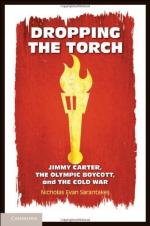|
This section contains 548 words (approx. 2 pages at 300 words per page) |

|
Since its rebirth in 1896, the modern Olympic Games have strived to represent the highest ideals of sport as diplomacy—the power of friendly competition to transcend world politics. But the games have often been over-shadowed by conflict and controversy as nations and groups used the high-profile event to make political statements.
When the Soviet Union entered Helsinki Summer Games in 1952, the games took on political overtones that only increased as the Cold War heated up. For many, the games became an almost symbolic struggle between the socialist and capitalist systems. Nothing illustrates this better than the 1980 Olympic Games in Lake Placid, New York when the underdog men's hockey team face off against the highly favored Soviet Squad. After being badly beaten by the Soviets 10–3 in a pre-Olympic exhibition game, the U.S. team came back and beat the mighty Russians, going on...
|
This section contains 548 words (approx. 2 pages at 300 words per page) |

|


